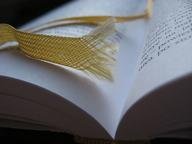Quiz Answer Key and Fun Facts
1. What is the title of Anne Bradstreet's collection of poems published in 1650, a book that seems to have been published without her permission or knowledge, and a book that made her the first published New Englander?
2. To demonstratie her humility as well as her humiliation, Anne Bradstreet writes a poem using an extended metaphor that begins with the following lines:
"Thou ill-formed offspring of my feeble brain,
Who after birth didst by my side remain,
Till snatched from thence by friends, less wise than true,
Who thee abroad, exposed to public view, . . ."
In the above lines, to what is Bradstreet referring to as if it were an embarrassing child?
3. During the summer of 1666, the year of the Great Fire in London, a tragedy occurred in Bradstreet's own life. She wrote a poem about it as well as about her guilt for having placed her hope in material possessions. Some of the lines are these:
"Then coming out, behold a space
The flame consume my dwelling place.
And when I could no longer look,
I blest His name that gave and took,
That laid my goods now in the dust;
Yea, so it was, and so 'twas just."
What is the name of Anne Bradstreet's poem, containing the above lines?
4. In one of Anne Bradstreet's lengthier poems--"Contemplations"--she begins by describing the beauty of the sun and its light. She refers to the sun as the "soul of this world, this universe's eye" and asks, "Art thou so full of glory that no eye / Hath strength thy shining rays once to behold? / And is thy splendid throne erect so high, / As to approach it, can no earthly mould?"
After considering her descriptions of this heavenly body, to what is she metaphorically comparing the sun?
5. Anne Bradstreet writes a poem that contains these words: "He heaps up riches, and he heaps up sorrow, / It's his today, but who's his heir tomorrow?" Later, she writes, "Where is it [consolation] then, in wisdom, learning, arts? / Sure if on earth, it must be in these parts; / Yet these the wisest man of men did find / But vanity, vexation of mind".
Drawing inspiration from Solomon and "Ecclesiastes", what did Bradstreet title the poem containing the above lines?
6. Not all of Anne Bradstreet's poetry illustrates tenets of her Puritan faith. Several of her poems show a very human side of their author. She is very much attached to this earth and dreads leaving it.
Which of the following listed items does Anne Bradstreet NOT fear happening in her poem "Before the Birth of One of Her Children"?
7. Anne Bradstreet wrote a few poems about the deaths of three of her grandchildren, and these illustrate quite vividly her personal struggle to reconcile her faith in God and his providence with tragic events that she cannot explain or understand. In the poem "In Memory of My Dear Grandchild Elizabeth Bradstreet, Who Deceased August, 1665, Being a Year and a Half Old", Bradstreet writes lines such as, "Farewell fair flower that for a space was lent" and " . . . buds new blown to have so short a date".
What figurative technique is Bradstreet using to refer to her granddaughter Elizabeth Bradstreet?
8. Another poem Anne Bradstreet wrote about the death of one of her grandchildren is entitled "On My Dear Grandchild Simon Bradstreet, Who Died on 16 Novemeber, 1669, Being But a Month, and One Day Old".
In this poem, Bradstreet writes that her grandson has been "Cropt by th'Almighty's hand". What is the meaning of "cropt"?
9. Not all of Anne Bradstreet's poetry was about tragedies that had occurred in her life. Some were quite joyful, such as the few she wrote about her husband and their happy relationship. In the poem "To My Dear and Loving Husband", she boasts:
"If ever two were one, then surely we.
If ever man were loved by wife, then thee;
If ever wife was happy in a man,
Compare with me, ye women, if you can."
What is the name of Anne Bradstreet's husband, a gentleman who served as Massachusetts Bay Colony's last governor?
10. Another poem wirtten by Anne Bradstreet to celebrate her love for her husband is entitled "A Letter to Her Husband, Absent upon Public Employment". In this poem, she refers to her husband as her "Sun" and feels that life is like winter because of his absence. She powerfully and passionately writes, "In this dead time, alas, what can I more / Than view those fruits which through thy heat I bore?"
To what do "those fruits" in the above lines refer?
Source: Author
alaspooryoric
This quiz was reviewed by FunTrivia editor
looney_tunes before going online.
Any errors found in FunTrivia content are routinely corrected through our feedback system.
